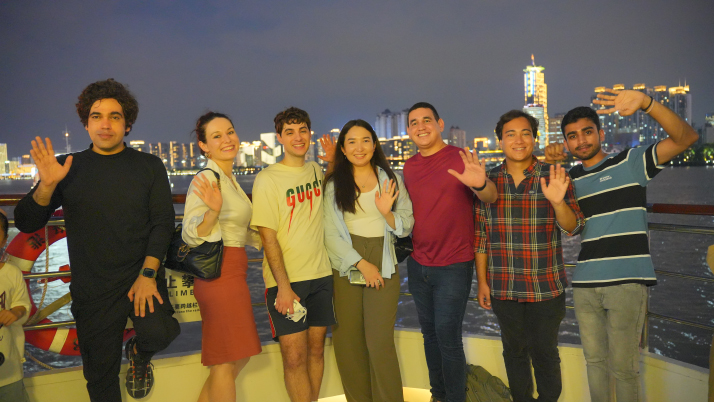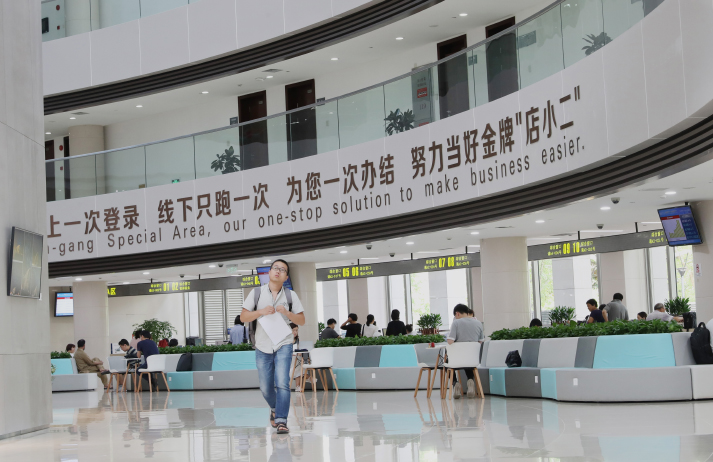| China |
| International youth get a feel for Chinese modernization in Shanghai | |
|
|
 International youth take a cruise on the Huangpu River to see some of Shanghai's most famous sights. The largest river flowing through the city, the Huangpu is referred to as Shanghai's "mother river" (ZHANG SHIQI)
'How did the Communist Party of China (CPC) evolve into its contemporary state?" It's fascinating to think that at the time of its first national congress more than 100 years ago, the Party had some 50 members. Today, it has over 98 million who maintain the same idealism attendees of that first-ever gathering had. With this question in mind, 17 young people from 12 countries, including China, Russia, Spain, Argentina and Brazil, on July 4 and 5 visited Shanghai—where the First CPC National Congress took place in 1921—to familiarize themselves with both the traditional and contemporary factors of the city, which in itself bears testimony to the long way China has come. On the evening of July 5, they also shared their observations and thoughts at an international youth dialogue with more Chinese participants from media outlets and universities. The activities were hosted by the China Center for International Communication Development under China International Communications Group and co-hosted by Shanghai University. "From this trip, I hope to learn how Shanghai has further modernized in recent years," Zoon Ahmed Khan, a Pakistani research fellow with the Beijing-based Center for China and Globalization think tank, told Beijing Review. She wanted to know how even a very developed city like Shanghai can continue to modernize and upgrade itself "in terms of ideas and policies that have already proven effective." Shanghai style On July 4, the group visited the China (Shanghai) Pilot Free Trade Zone (FTZ). Located in Pudong New Area and established in 2013, it was the first of its kind in China and has been a driver of the city's reform and opening up ever since. FTZs are types of special economic zones where goods may be imported, handled, manufactured and exported without direct intervention from customs. China's 21 FTZs, which are mostly located along the east coast, have facilitated the country's institutional innovation over the past decade. Each of them has an industrial and economic focus, with different incentives to fulfill their objectives. For example, the Shanghai Pudong International Talent Hub, established in the Zhangjiang Science Park in 2021, is an important part of the Shanghai FTZ. It provides a one-stop service center for high-caliber professionals from across the globe to apply for a Chinese work permit. Prior to that, Shanghai-based expats had to make at least two trips to related government departments to obtain said document. To better serve talents coming in from overseas, several national and international human resources industry leaders have set up offices in the hub, including Manpower and Liepin.com. "Today's visit has shown me just how remarkable Shanghai's economic progress has been and still is. I believe its experiences are relevant to other FTZs in China and even those in some other countries," Russian expat Olga Pronkina, a professor at the School of Foreign Affairs and Law, Gansu University of Political Science and Law, told Beijing Review. The group also visited the Shanghai Urban Planning Exhibition Hall that same day. Themed City, Human, Environment and Development, the hall showcases the city's development concept. "Shanghai is a representation of a city of the future," Turdubekova Munara, a Kyrgyz student majoring in business administration at Shanghai University, told Beijing Review. She hoped the two-day trip would help her learn more about the megacity. "I am quite interested in urban planning. Shanghai, as one of the largest cities in the world, must feature favorable practices in this field while also having encountered its fair share of problems," Noel Sirerol Gonzalez, a vlogger from Spain, told Beijing Review. "I think this is an interesting topic for others to look at and learn from." The Gubei Civic Center, located in Shanghai's Changning District, is much more than a community center. It is a place where grassroots officials and residents regularly gather to share their suggestions for the development of the community, the city and even the country. Opinions solicited from such institutions are conveyed to the National People's Congress, China's top legislature, and taken into consideration when amending the country's laws. When visiting the center on the afternoon of July 5, Khan was surprised to find foreign residents, too, can put forward suggestions. Over 50 percent of residents in the Gubei community are expats. "China is one country where people who are on the frontlines, ordinary people, are important in terms of decision-making," Khan said during the dialogue later that day. For example, China has the National People's Congress and the Chinese People's Political Consultative Conference, whose national committee is the country's top political advisory body. "China has many mechanisms to actually engage ordinary people in the process of understanding what the next quest to move forward is," she added.  The administrative service center of the Lin-gang New Area of the China (Shanghai) Pilot Free Trade Zone on August 20, 2019 (XINHUA)
The Party's role On the morning of July 5, the group visited the memorial of the First CPC National Congress. A small room with a small table in it, this pivotal congress was one of simplicity and straightforwardness. "I was fascinated by the fact that the CPC had gone through a centennial journey," Pronkina said, adding she'd asked herself, "What's its secret that the Party continues to deliver to the people?" From her viewpoint, this is because the Party serves the people and the people, in turn, support the Party. "My Chinese language teacher always tells me there would be no New China without the CPC. I think this summarizes the idea that the CPC has in terms of its strong leadership and guidance of Chinese modernization," Pedro Steenhagen, a Brazilian doctoral candidate in international politics at Shanghai's Fudan University, told Beijing Review. "China has shown, with its own modernization, that there is a new pathway for the Global South to achieve good, green, strong development, and it doesn't necessarily need to follow whatever is already there, specifically from already developed nations, but that they can find their own path," Steenhagen added. Leandro Casarete, an Argentine researcher with Shanghai-based media organization Dongsheng News, echoed Steenhagen's views and said during the dialogue that each country must find its own model as China did, and adapt this to its own reality, culture and history. "That is why China does not offer an alternative. China is proof that there are other optional paths toward modernization for developing countries," the researcher explained. Pronkina also remarked that the China-proposed Belt and Road Initiative, which aims to boost connectivity along and beyond the ancient Silk Road routes, is contributing Chinese knowhow to international cooperation and providing a solution to eliminating factors leading to global instability, which shows China's sense of responsibility as a major country. Sun Huiyan, an associate professor at the College of Marxism under Shanghai University, said at the dialogue that the CPC's success in leading China's transformation into the major global player it is today has two underlying reasons: "self-reform and driving social revolution through self-reform," in other words, leading Chinese modernization by keeping itself abreast of the times. (Print Edition Title: A Trip and a Talk) Copyedited by Elsbeth van Paridon Comments to taoxing@cicgamericas.com |
|
||||||||||||||||||||||||||||||
|
